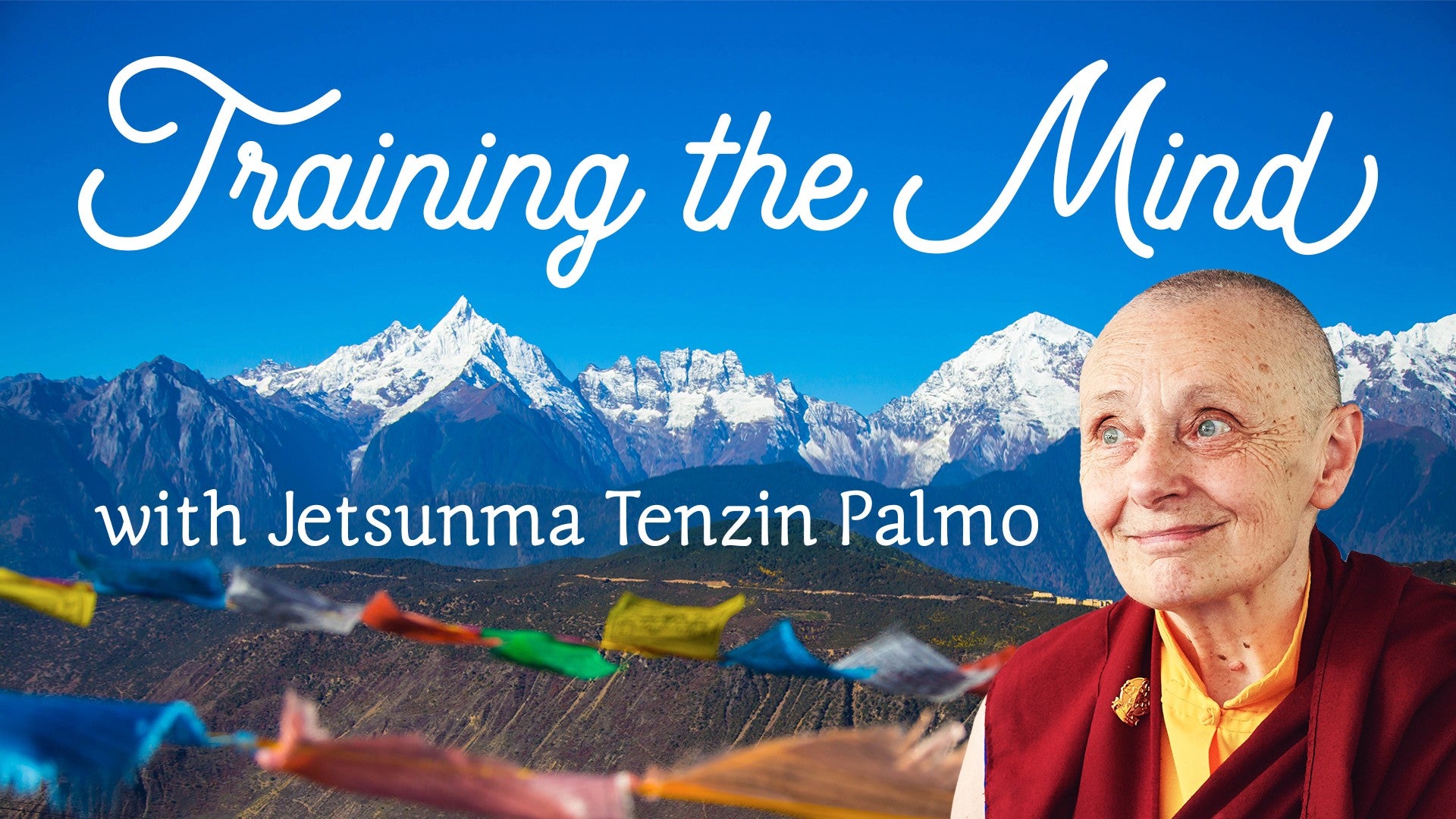Description
About This Video
Transcript
Read Full Transcript
So then he says, the supreme spiritual discipline is to tame one's own mind, are you? The Buddha said that we, I mean two thousand six hundred years ago, the Buddha said that we have a mad monkey mind. What he would say today, I don't know. But even at that time it was, the mind was compared to a monkey. Now not the nice friendly or bored monkeys you meet in zoos, but monkeys in the wild.
We live in India and we know about monkeys. And they are a real problem, actually. They are real problem monkeys. And one of the thing about monkeys is they're very restless. They're always jumping around.
If you have, for example, a fruit tree, even if the fruit is unripe, the monkey will come, will take a piece of fruit, one bite, throw it down, next piece of fruit. So within no time at all, the whole tree is devastated, right? And this is like the mind. We get one thing and we take a bite out of it, okay, yeah. Now where's the next thing?
Where's the next thing? Where's the next thing? Always, constantly unsatisfied, constantly seeking for pleasure, constantly looking for some ultimate fulfillment which it never can get. And so it's jumping here, jumping there, jumping somewhere else, constantly. Now most people are not conscious of what a mess our minds are in until they sit down and are told, just concentrate on breathing in and breathing out.
Now that's so easy. Anybody can do that. Here I am breathing and now I'm going to breathe in and breathe out and breathe in and breathe out. And I wonder how long this session is going to go on for. Oh yeah, breathing in, breathing out.
I wonder what she meant when she said that, I'm not sure what she meant. Maybe she meant breathing in, breathing out and everybody knows that just even for a few minutes to get the mind settled is a challenge because it's a monkey. And monkeys are always looking for entertainment, jumping here and there and everywhere and so everybody. The first thing they discover when they try to meditate is that, well they think often that the mind has become more busy. I was better before I tried meditating.
Now my mind is too busy. But it's of course always the teachers then say, but that's a good thing because now we realize the problem. It's like having a television on in the mind constantly. You can't turn it off, chatty, chatty, chatty plus all the commercials, all the soap operas endlessly repeated and there it is, yakety, yakety, yakety, yakety, yakety, yakety, non-stop. We live with that.
No wonder people feel desperate. So step number one, tame the mind. So in Buddhism there are two basic levels of meditation in general. The first is called shamatha which means to calm the mind, to get the mind quiet and at the same time hone the skills of being able to be more mindful, more attentive and in general more single pointed so the mind isn't running all over the place. We put it on an object and it rests there.
So this is the first level which is the taming of the mind. When the mind is able to be settled relatively okay, even the thoughts are flowing but they're flowing more quietly and we're able to maintain our attention on the object of our meditation, then we turn the focus of the meditation onto the mind itself and begin to observe what's going on in the mind, non-judgmentally just watching what is how it's all flowing along like a river. Normally we are in that river, normally we are swept along by the river so we don't even notice that it's a river, a torrent actually. But once we try to step back and sit on the banks of the river, just watching the river going by, then we recognize how fast that river is flowing moment after moment after moment thoughts coming and disappearing and thoughts coming and disappearing and feelings coming up and just observing. Once we are able to do that and the mind has quietened down considerably, then we start analyzing the mind.
What is a thought? Where does it come from? Where does it go to? What is a feeling? When we get impetus coming through the senses, what is that?
How does the mind process that? Really beginning to understand the mind when the mind is quiet, when the mind is busy and that awareness which can discriminate. Are they the same? Are they different? Who is thinking?
And then if you say, I am thinking, the big question, who am I? So in this way, we work with the mind, understanding, because wherever we go, we take our mind with us. So doesn't it make sense to have a well-tamed mind? Because as long as our mind is not tamed and is controlled by all our greed and our anger and our jealousies and pride and delusions, it's not a happy mind. And it causes problems for itself, it causes problems for other people.
We all want to be happy, so why aren't we? We've put enough energy into it. But the reason we're not happy, genuinely happy, because genuine happiness does not depend on external circumstances and pleasure. We imagine that happiness means one pleasant thing after the other after the other and totally avoiding anything which doesn't please us. Then we'll be happy.
But it's not true. It's not true. And genuine happiness is something inside us, is a kind of inner joy like a spring bubbling up which has nothing to do with what's happening on the outside, very little. We can be in the most outwardly deprived or even threatening situations and inwardly be joyful. We can be in the most luxurious outer circumstances and be totally miserable.
Which is why so many people are on, you know, valium and opiates and depression is considered to be the number one challenge, especially in affluent societies, isn't it interesting? So step number one, taming the mind. Taming the mind means quietening the mind down and honing our ability for attention, learning how to be more mindful, more present, more aware, and more in control. Sometimes we live in our minds, but most of us are the slaves to our mind. I mean, if we were not the slaves, if we were not servants to our mind, then in the morning we could wake up and say, okay, this is another day, so today I'm going to be peaceful and kind and generous and patient and happy and filled with love and compassion for all beings.
And so it will be, we're in command. I mean, how many people wake up and think, I don't know, today maybe I'll be miserable, grumpy, depressed, irritated, and genuinely, you know, feeding my low self-esteem. That sounds like a good day. Let's have a go at that. But because we are not in control of our own minds, we have little choice.
This is why we need to cultivate the ability to become more and more in control of our inner psyche, our inner space, so that we can slowly, slowly become what we would aspire to become. It takes work like anything, and Buddhists are always talking about practice. And so like any skill, if we want to learn to be a musician or a dancer or a sports person or any skill, we have to practice. Practice and practice and practice until it becomes effortless. But nobody, I mean, even Mozart couldn't just sit down when he was two years old and immediately play.
He had to practice. Everybody has to practice. I mean, a weekend course isn't going to do it. They say to become a professional musician, a really professional musician, takes at least 30,000 hours of practice. That's a lot, just to learn how to twiddle your fingers, but to speak of becoming the master of our own mind.
So we've got work to do, okay? But this is not only will it completely, however far we go, transform our lives for the better and transform the lives of the people around us, but also from a Buddhist perspective, we can take this skill into our future lives too. The most important thing we have is our own mind. It's ridiculous that the mind runs its own show, the ego runs its own show, because it's not on our side, so to say, right? It's just it has its own agenda.
This is why the ego leads us into so many problems and so much trouble. It's not wise. Has no wisdom. And therefore we find ourselves doing things which are totally counterproductive, really stupid when we look back later and think, why the hell did I do that? So step number one is to learn to tame the mind, to become the masters of our own mind instead of the slaves of our mind.
That is already an enormous achievement. If we can even go somewhere towards that in this lifetime, that's an enormous step along the path. Because taming the mind is like the foundation, you know, if we don't have deep, strong foundations, every building we are going to build will crumble. And so therefore this making the basis strong, the rest comes up very quickly. So first we tame the mind.
It's like if you have a horse, you know, a wild horse, and we look at that wild horse and we think, wow, that horse has great potential, but it's wild. We cannot train it while it's wild. First we have to tame it to make it friendly. Now we can tame a horse by beating it into submission. And then we get a very unhappy, if compliant horse.
But every horse trainer knows that you bring your horse into wanting training by getting it to trust and to be enthusiastic for the training. So this learning how to calm the mind and develop this wholeness ability for attention in the present moment makes the mind happy. And then the mind feels enthusiastic to go further, to be trained, to be transformed, and eventually to be transcended. We have to start where we are by making the mind more quiet, more silent, more focused, and on that strong basis building up the rest of the path. So this is why a Tisha says supreme spiritual discipline is to tame one's own mind.
It's not about merely taming the body, disciplining the body. It's about disciplining the mind, because the mind is the crux of the matter. We know everything through our mind. And while our mind is crazy, then how can we hope that our speech and actions will be skillful? The point is deal with the mind.
The mind is the source of everything. If our mind is well tamed, then our speech and our actions will likewise be tamed and disciplined naturally without forcing. But if we outwardly look very disciplined and inwardly are wild, then it will just explode and just be crazy. We live in our mind. This is the point.
You can't leave your mind behind. Everywhere we go, we take our mind with us. Even in our dreams, we have our mind. We cannot leave the mind behind. So doesn't it make sense to have a nice, happy, well-tamed mind?
It's obvious. This has nothing to do with Buddhism, per se, or anything else. This is just common sense, albeit enlightened common sense. It's common sense to live in this world with a well-tamed mind, because everything we view outwardly and inwardly depends on our mind. And if we're miserable, it's because our mind is miserable.
If we're happy, it's because our mind is happy. Can't blame outer circumstances. It depends on our own mind. How we respond to other people, to outer circumstances, depends on the mind. It's very important.
We're always blaming the government, haha. The local council, our neighbors, our family, our work colleagues, it's all there for, nah. Problem is inside. How we are dealing with these outer situations, skillfully or unskillfully, and that depends on how our mind is in our control or out of our control.
Training the Mind with Jetsunma Tenzin Palmo
Comments
You need to be a subscriber to post a comment.
Please Log In or Create an Account to start your free trial.















